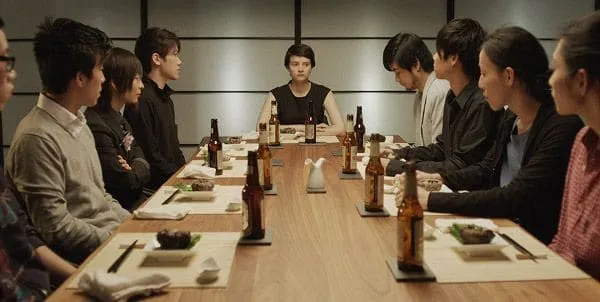Eye For Film >> Movies >> Tokyo Fiancée (2014) Film Review
Tokyo Fiancée
Reviewed by: Jane Fae

Tokyo Fiancee is a bittersweet tale of misdirected romance.
On the one side, we have Amélie (Pauline Etienne), a young Belgian, born in Japan, raised, for the first few years of her life, in Japan, and driven by a burning desire to become Japanese. On the other - in many ways her mirror image - is Rinri (Taichi Inoue), son of a traditional Japanese family, moved equally by his passion for all things French.

They meet, naturally enough, over French lessons. Amélie is offering/Rinri is paying and their coming together is as inevitable as sunrise and moonset. Equally inevitable is the falling in love that follows.
Unfortunately, the path of true love is never smooth. Rinri is taciturn, secretive and, with his fascination for films about the Yakuza (Japanese organised crime) and pole-dancing clubs, a decidedly unconventional catch. Add a well-meaning and controlling family, plus a tendency to show rather than ever open up about his feelings, and it is hard not to conclude that this is a relationship doomed from the outset.
Certainly, it appears to do little for Amélie , who shifts from happy-go-lucky naive – the very definition of gamine – on her arrival in Japan, to sombre and introspective as her love for Rinri deepens. In the end, Rinri proposes marriage and Amélie deflects by agreeing to get engaged (becoming the Tokyo Fiancee of the title).
But is this really love? Will their engagement end in tying the knot? Or, as one of Amélie’s friends observes, is it simply the case that a relationship between a Japanese man and a western woman cannot work? It takes a major natural disaster to focus minds: though it would be a spoiler too far to reveal which way they finally jump.
This is a well-made, interesting film, with some nice touches. Director Stefan Liberski catches both mood and place very well - the soundtrack matches Amélie well, starting off light and optimistic, growing more sombre as the film progresses. And if you were not well acquainted with Japan you will be much more so by the end.
There is also an interesting use of food. Rinri cooks – cooks well – and this ability surfaces here and there underscoring key points in the drama: from his making of an Okonomiyaki pancake (literally, "what you like") early in their relationship to his preparation of a full formal meal later on. Gross, or clever, according to taste, is a scene in which, quite literally, an octopus has Amélie ’s tongue. Yes, eating live octopus is a thing in Japan: and no, taking a mouthful of live tentacle just as you are about to say something very important to your would-be life partner is not a good idea.
Useful support comes from Julie Le Breton, as Amélie ’s friend Christine and Alice de Lencquesaing, as enemy Yasmine: likewise Tokio Yokoi and Hiromi Asai as, respectively, father and mother to Rinri.
In the end, though, this is a film about just two people, and they are centre-stage for most of it.
Outwardly, it is a film about love and romance. At its heart, though is more cynical observation - that sometimes people fall in love because of what someone is, what they represent, rather than who they are; and that, in the end, is unlikely to end well.
Perhaps it was that darker perspective that detracted but in the end, for all its good points, this film left me largely untouched and unsympathetic.
Reviewed on: 23 Nov 2015















